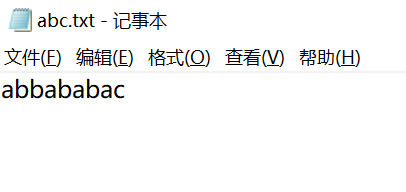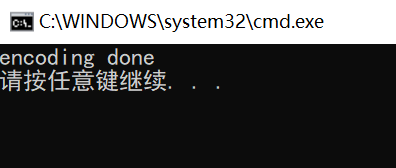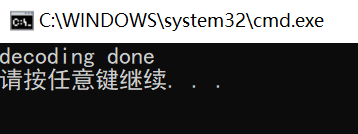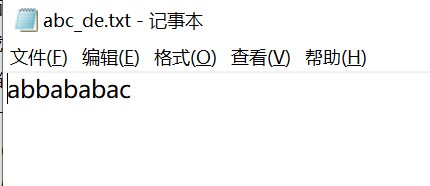1 实验目的
掌握词典编码的基本原理,用C/C++/Python等语言编程实现LZW解码器并分析编解码算法。
2 实验原理
2.1 LZW编码原理

-
初始字典包含所有的单字符,初始化P=NULL;
-
将数据流的下一个字符赋给C;
-
判断P+C(P连接C)这个字符是否在字典里:
(1)是——P=P+C;
(2)否——输出P对应的码字CW,将P+C作为新串写入字典,P=C; -
返回步骤2。
2.2 LZW解码原理
- 在开始译码时词典包含所有可能的前缀根;
- 令CW=码字流中的第一个码字;
- 输出当前缀-符串string.CW到码字流;
- 先前码字PW=当前码字CW;
- 当前码字CW=码字流的下一个码字;
- 判断当前缀-符串string.CW 是否在词典中;
(1)是——把当前缀-符串string.CW输出到字符流:
当前前缀P=先前缀-符串string.PW;
当前字符C=当前前缀-符串string.CW的第一个字符;
把缀-符串P+C添加到词典;
(2)否——当前前缀P=先前缀-符串string.PW。
当前字符C=当前缀-符串string.CW的第一个字符。
输出缀-符串P+C到字符流,然后把它添加到词典中。 - 判断码字流中是否还有码字要译:
(1)是——返回步骤4;
(2)否——结束。
3 实验代码
1.bitio.h
/*
* Declaration for bitwise IO
*
* vim: ts=4 sw=4 cindent
*/
#ifndef __BITIO__
#define __BITIO__
#include <stdio.h>
typedef struct{
FILE *fp;
unsigned char mask;
int rack;
}BITFILE;
BITFILE *OpenBitFileInput( char *filename);
BITFILE *OpenBitFileOutput( char *filename);
void CloseBitFileInput( BITFILE *bf);
void CloseBitFileOutput( BITFILE *bf);
int BitInput( BITFILE *bf);
unsigned long BitsInput( BITFILE *bf, int count);
void BitOutput( BITFILE *bf, int bit);
void BitsOutput( BITFILE *bf, unsigned long code, int count);
#endif // __BITIO__
2.bitio.c(主要涉及文件的读取与写入)
/*
* Definitions for bitwise IO
*
* vim: ts=4 sw=4 cindent
*/
#include <stdlib.h>
#include <stdio.h>
#include "bitio.h"
BITFILE *OpenBitFileInput( char *filename){
BITFILE *bf;
bf = (BITFILE *)malloc( sizeof(BITFILE));
if( NULL == bf) return NULL;
if( NULL == filename) bf->fp = stdin;
else bf->fp = fopen( filename, "rb");
if( NULL == bf->fp) return NULL;
bf->mask = 0x80;
bf->rack = 0;
return bf;
}
BITFILE *OpenBitFileOutput( char *filename){
BITFILE *bf;
bf = (BITFILE *)malloc( sizeof(BITFILE));
if( NULL == bf) return NULL;
if( NULL == filename) bf->fp = stdout;
else bf->fp = fopen( filename, "wb");
if( NULL == bf->fp) return NULL;
bf->mask = 0x80;
bf->rack = 0;
return bf;
}
void CloseBitFileInput( BITFILE *bf){
fclose( bf->fp);
free( bf);
}
void CloseBitFileOutput( BITFILE *bf){
// Output the remaining bits
if( 0x80 != bf->mask) fputc( bf->rack, bf->fp);
fclose( bf->fp);
free( bf);
}
int BitInput( BITFILE *bf){
int value;
if( 0x80 == bf->mask){
bf->rack = fgetc( bf->fp);
if( EOF == bf->rack){
fprintf(stderr, "Read after the end of file reached\n");
exit( -1);
}
}
value = bf->mask & bf->rack;
bf->mask >>= 1;
if( 0==bf->mask) bf->mask = 0x80;
return( (0==value)?0:1);
}
unsigned long BitsInput( BITFILE *bf, int count){
unsigned long mask;
unsigned long value;
mask = 1L << (count-1);
value = 0L;
while( 0!=mask){
if( 1 == BitInput( bf))
value |= mask;
mask >>= 1;
}
return value;
}
void BitOutput( BITFILE *bf, int bit){
if( 0 != bit) bf->rack |= bf->mask;
bf->mask >>= 1;
if( 0 == bf->mask){ // eight bits in rack
fputc( bf->rack, bf->fp);
bf->rack = 0;
bf->mask = 0x80;
}
}
void BitsOutput( BITFILE *bf, unsigned long code, int count){
unsigned long mask;
mask = 1L << (count-1);
while( 0 != mask){
BitOutput( bf, (int)(0==(code&mask)?0:1));
mask >>= 1;
}
}
#if 0
int main( int argc, char **argv){
BITFILE *bfi, *bfo;
int bit;
int count = 0;
if( 1<argc){
if( NULL==OpenBitFileInput( bfi, argv[1])){
fprintf( stderr, "fail open the file\n");
return -1;
}
}else{
if( NULL==OpenBitFileInput( bfi, NULL)){
fprintf( stderr, "fail open stdin\n");
return -2;
}
}
if( 2<argc){
if( NULL==OpenBitFileOutput( bfo, argv[2])){
fprintf( stderr, "fail open file for output\n");
return -3;
}
}else{
if( NULL==OpenBitFileOutput( bfo, NULL)){
fprintf( stderr, "fail open stdout\n");
return -4;
}
}
while( 1){
bit = BitInput( bfi);
fprintf( stderr, "%d", bit);
count ++;
if( 0==(count&7))fprintf( stderr, " ");
BitOutput( bfo, bit);
}
return 0;
}
#endif
3.lzw_E.c
/*
* Definition for LZW coding
*
* vim: ts=4 sw=4 cindent nowrap
*/
#include <stdlib.h>
#include <stdio.h>
#include "bitio.h"
#define MAX_CODE 65535
struct {
int suffix;
int parent, firstchild, nextsibling;
} dictionary[MAX_CODE+1];
int next_code;
int d_stack[MAX_CODE]; // stack for decoding a phrase
#define input(f) ((int)BitsInput( f, 16))
#define output(f, x) BitsOutput( f, (unsigned long)(x), 16)
int DecodeString( int start, int code);
void InitDictionary( void);
void PrintDictionary( void){
int n;
int count;
for( n=256; n<next_code; n++){
count = DecodeString( 0, n);
printf( "%4d->", n);
while( 0<count--) printf("%c", (char)(d_stack[count]));
printf( "\n");
}
}
int DecodeString( int start, int code){
int count;
count = start;
while( 0<=code){
d_stack[ count] = dictionary[code].suffix;
code = dictionary[code].parent;
count ++;
}
return count;
}
void InitDictionary( void){
int i;
for( i=0; i<256; i++){
dictionary[i].suffix = i;
dictionary[i].parent = -1;
dictionary[i].firstchild = -1;
dictionary[i].nextsibling = i+1;
}
dictionary[255].nextsibling = -1;
next_code = 256;
}
/*
* Input: string represented by string_code in dictionary,
* Output: the index of character+string in the dictionary
* index = -1 if not found
*/
int InDictionary( int character, int string_code){
int sibling;
if( 0>string_code) return character;
sibling = dictionary[string_code].firstchild;
while( -1<sibling){
if( character == dictionary[sibling].suffix) return sibling;
sibling = dictionary[sibling].nextsibling;
}
return -1;
}
void AddToDictionary( int character, int string_code){
int firstsibling, nextsibling;
if( 0>string_code) return;
dictionary[next_code].suffix = character;
dictionary[next_code].parent = string_code;
dictionary[next_code].nextsibling = -1;
dictionary[next_code].firstchild = -1;
firstsibling = dictionary[string_code].firstchild;
if( -1<firstsibling){ // the parent has child
nextsibling = firstsibling;
while( -1<dictionary[nextsibling].nextsibling )
nextsibling = dictionary[nextsibling].nextsibling;
dictionary[nextsibling].nextsibling = next_code;
}else{// no child before, modify it to be the first
dictionary[string_code].firstchild = next_code;
}
next_code ++;
}
void LZWEncode( FILE *fp, BITFILE *bf){
int character;
int string_code;
int index;
unsigned long file_length;
fseek( fp, 0, SEEK_END);
file_length = ftell( fp);
fseek( fp, 0, SEEK_SET);
BitsOutput( bf, file_length, 4*8);
InitDictionary();
string_code = -1;
while( EOF!=(character=fgetc( fp))){
index = InDictionary( character, string_code);
if( 0<=index){ // string+character in dictionary
string_code = index;
}else{ // string+character not in dictionary
output( bf, string_code);
if( MAX_CODE > next_code){ // free space in dictionary
// add string+character to dictionary
AddToDictionary( character, string_code);
}
string_code = character;
}
}
output( bf, string_code);
}
void LZWDecode( BITFILE *bf, FILE *fp){
int character;
int new_code, last_code;
int phrase_length;
unsigned long file_length;
file_length = BitsInput( bf, 4*8);
if( -1 == file_length) file_length = 0;
/*需填充*/
InitDictionary();//初始化字典
last_code = -1;//pw=-1;
while( 0<file_length)
{
new_code = input( bf);//读入一个代号,new_code指cw
if( new_code >= next_code)//如果读入的代号比字典最大代号还大,即该代号不在字典里
{ // this is the case CSCSC( not in dict)
d_stack[0] = character;//pw的代号character存入输出字符串最后一个字符中(因为d_stack倒序输出)
phrase_length = DecodeString( 1, last_code);//解出字符,将pw写入d_stack(因为位置0已经写入pw代号,所以从位置1写入)
}
else//如果代号存在于字典中
{
phrase_length = DecodeString( 0, new_code);//解出字符,将pw写入d_stack
}
character = d_stack[phrase_length-1];//将cw首字符存入character
while( 0<phrase_length)
{
phrase_length --;
fputc( d_stack[ phrase_length], fp);//输出当前码字对应的字符串
file_length--;
}
if( MAX_CODE>next_code)//如果字典还有空间
{// add the new phrase to dictionary
AddToDictionary( character, last_code);//将P+C写入字典
}
last_code = new_code;//更新词条数
}
}
int main( int argc, char **argv){
FILE *fp;
BITFILE *bf;
if( 4>argc){
fprintf( stdout, "usage: \n%s <o> <ifile> <ofile>\n", argv[0]);
fprintf( stdout, "\t<o>: E or D reffers encode or decode\n");
fprintf( stdout, "\t<ifile>: input file name\n");
fprintf( stdout, "\t<ofile>: output file name\n");
return -1;
}
if( 'E' == argv[1][0]){ // do encoding
fp = fopen( argv[2], "rb");
bf = OpenBitFileOutput( argv[3]);
if( NULL!=fp && NULL!=bf){
LZWEncode( fp, bf);
fclose( fp);
CloseBitFileOutput( bf);
fprintf( stdout, "encoding done\n");
}
}else if( 'D' == argv[1][0]){ // do decoding
bf = OpenBitFileInput( argv[2]);
fp = fopen( argv[3], "wb");
if( NULL!=fp && NULL!=bf){
LZWDecode( bf, fp);
fclose( fp);
CloseBitFileInput( bf);
fprintf( stdout, "decoding done\n");
}
}else{ // otherwise
fprintf( stderr, "not supported operation\n");
}
return 0;
}
4 实验步骤
1.首先调试LZW的编码程序,以一个文本文件作为输入,得到输出的LZW编码文件。
编写一个文本文件:

设置命令参数:

运行结果:


2.以实验步骤一得到的编码文件作为输入,编写LZW的解码程序。在写解码程序时需要对关键语句加上注释(见3 实验代码),并说明进行何操作。在实验报告中重点说明当前码字在词典中不存在时应如何处理并解释原因。
(1)验证解码
修改命令参数:

实验结果:


查看abc_de.txt:

发现与原始文本文件一致,成功解码。
(2)当前码字在字典中不存在问题
原因:编码时,上一个新的词条刚被创建,下一个词组就需要使用它。即解码端的解码会比编码端晚一步。我们还没有得到最新的词条就需要使用它。
解决方法:下一个词条的尾缀是当前词条的第一个字符,所以就先输出这个字符,然后用前一词条的代号进行解码。
3.选择至少十种不同格式类型的文件,使用LZW编码器进行压缩得到输出的压缩比特流文件。对各种不同格式的文件进行压缩效率的分析。
十种不同格式类型文件:

压缩后:

压缩比统计:
| 文件类型 | 原始大小 | 压缩后大小 | 压缩比 |
|---|---|---|---|
| .aedt | 225KB | 86KB | 38.2% |
| .docx | 30KB | 46KB | 153.3% |
| .tif | 154KB | 199KB | 129.2% |
| .yuv | 28800KB | 209KB | 0.73% |
| .dxf | 41KB | 16KB | 39.0% |
| .dwg | 109KB | 132KB | 121.1% |
| .tga | 3418KB | 2796KB | 81.8% |
| .csv | 15KB | 8KB | 53.3% |
| .opj | 66KB | 37KB | 56.1% |
| .png | 407KB | 511KB | 125.6% |
结论:对于部分文件类型,经过LZW编码后,文件反而变大了,这是由于这些文件本身就是经过一定压缩后得到的,所以使用LZW编码反而增加了冗余。而对于.yuv这种比较原始,没有经过处理的文件格式来说,经过LZW编码后文件大小大大地减小了。






















 605
605











 被折叠的 条评论
为什么被折叠?
被折叠的 条评论
为什么被折叠?








